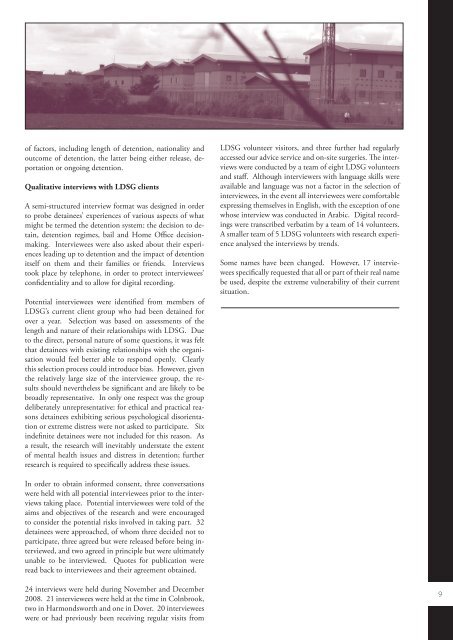Detained Lives: the real cost of indefinite ... - Detention Action
Detained Lives: the real cost of indefinite ... - Detention Action
Detained Lives: the real cost of indefinite ... - Detention Action
You also want an ePaper? Increase the reach of your titles
YUMPU automatically turns print PDFs into web optimized ePapers that Google loves.
<strong>of</strong> factors, including length <strong>of</strong> detention, nationality and<br />
outcome <strong>of</strong> detention, <strong>the</strong> latter being ei<strong>the</strong>r release, deportation<br />
or ongoing detention.<br />
Qualitative interviews with LDSG clients<br />
A semi-structured interview format was designed in order<br />
to probe detainees’ experiences <strong>of</strong> various aspects <strong>of</strong> what<br />
might be termed <strong>the</strong> detention system: <strong>the</strong> decision to detain,<br />
detention regimes, bail and Home Office decisionmaking.<br />
Interviewees were also asked about <strong>the</strong>ir experiences<br />
leading up to detention and <strong>the</strong> impact <strong>of</strong> detention<br />
itself on <strong>the</strong>m and <strong>the</strong>ir families or friends. Interviews<br />
took place by telephone, in order to protect interviewees’<br />
confidentiality and to allow for digital recording.<br />
Potential interviewees were identified from members <strong>of</strong><br />
LDSG’s current client group who had been detained for<br />
over a year. Selection was based on assessments <strong>of</strong> <strong>the</strong><br />
length and nature <strong>of</strong> <strong>the</strong>ir relationships with LDSG. Due<br />
to <strong>the</strong> direct, personal nature <strong>of</strong> some questions, it was felt<br />
that detainees with existing relationships with <strong>the</strong> organisation<br />
would feel better able to respond openly. Clearly<br />
this selection process could introduce bias. However, given<br />
<strong>the</strong> relatively large size <strong>of</strong> <strong>the</strong> interviewee group, <strong>the</strong> results<br />
should never<strong>the</strong>less be significant and are likely to be<br />
broadly representative. In only one respect was <strong>the</strong> group<br />
deliberately unrepresentative: for ethical and practical reasons<br />
detainees exhibiting serious psychological disorientation<br />
or extreme distress were not asked to participate. Six<br />
<strong>indefinite</strong> detainees were not included for this reason. As<br />
a result, <strong>the</strong> research will inevitably understate <strong>the</strong> extent<br />
<strong>of</strong> mental health issues and distress in detention; fur<strong>the</strong>r<br />
research is required to specifically address <strong>the</strong>se issues.<br />
LDSG volunteer visitors, and three fur<strong>the</strong>r had regularly<br />
accessed our advice service and on-site surgeries. The interviews<br />
were conducted by a team <strong>of</strong> eight LDSG volunteers<br />
and staff. Although interviewers with language skills were<br />
available and language was not a factor in <strong>the</strong> selection <strong>of</strong><br />
interviewees, in <strong>the</strong> event all interviewees were comfortable<br />
expressing <strong>the</strong>mselves in English, with <strong>the</strong> exception <strong>of</strong> one<br />
whose interview was conducted in Arabic. Digital recordings<br />
were transcribed verbatim by a team <strong>of</strong> 14 volunteers.<br />
A smaller team <strong>of</strong> 5 LDSG volunteers with research experience<br />
analysed <strong>the</strong> interviews by trends.<br />
Some names have been changed. However, 17 interviewees<br />
specifically requested that all or part <strong>of</strong> <strong>the</strong>ir <strong>real</strong> name<br />
be used, despite <strong>the</strong> extreme vulnerability <strong>of</strong> <strong>the</strong>ir current<br />
situation.<br />
In order to obtain informed consent, three conversations<br />
were held with all potential interviewees prior to <strong>the</strong> interviews<br />
taking place. Potential interviewees were told <strong>of</strong> <strong>the</strong><br />
aims and objectives <strong>of</strong> <strong>the</strong> research and were encouraged<br />
to consider <strong>the</strong> potential risks involved in taking part. 32<br />
detainees were approached, <strong>of</strong> whom three decided not to<br />
participate, three agreed but were released before being interviewed,<br />
and two agreed in principle but were ultimately<br />
unable to be interviewed. Quotes for publication were<br />
read back to interviewees and <strong>the</strong>ir agreement obtained.<br />
24 interviews were held during November and December<br />
2008. 21 interviewees were held at <strong>the</strong> time in Colnbrook,<br />
two in Harmondsworth and one in Dover. 20 interviewees<br />
were or had previously been receiving regular visits from<br />
9

















